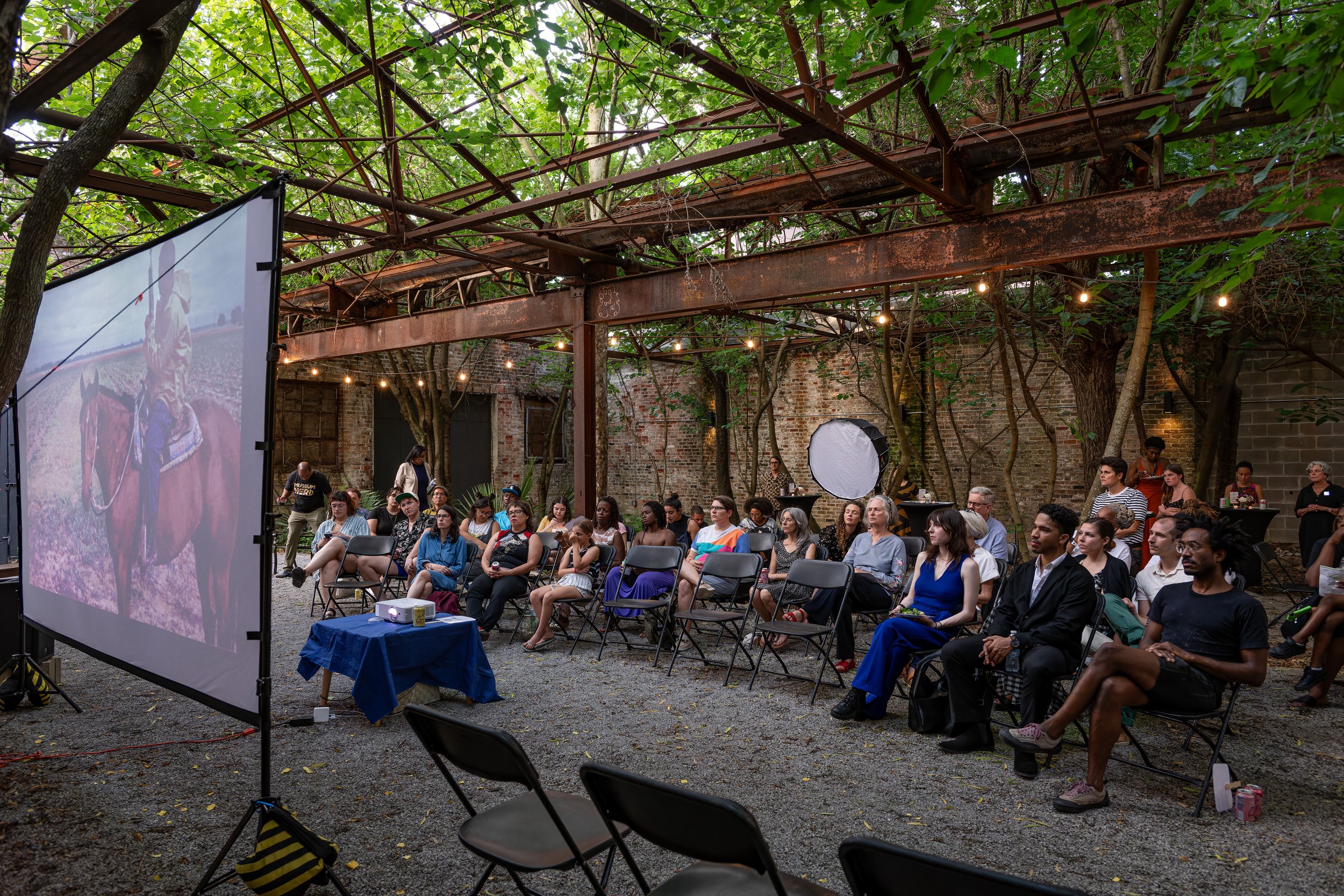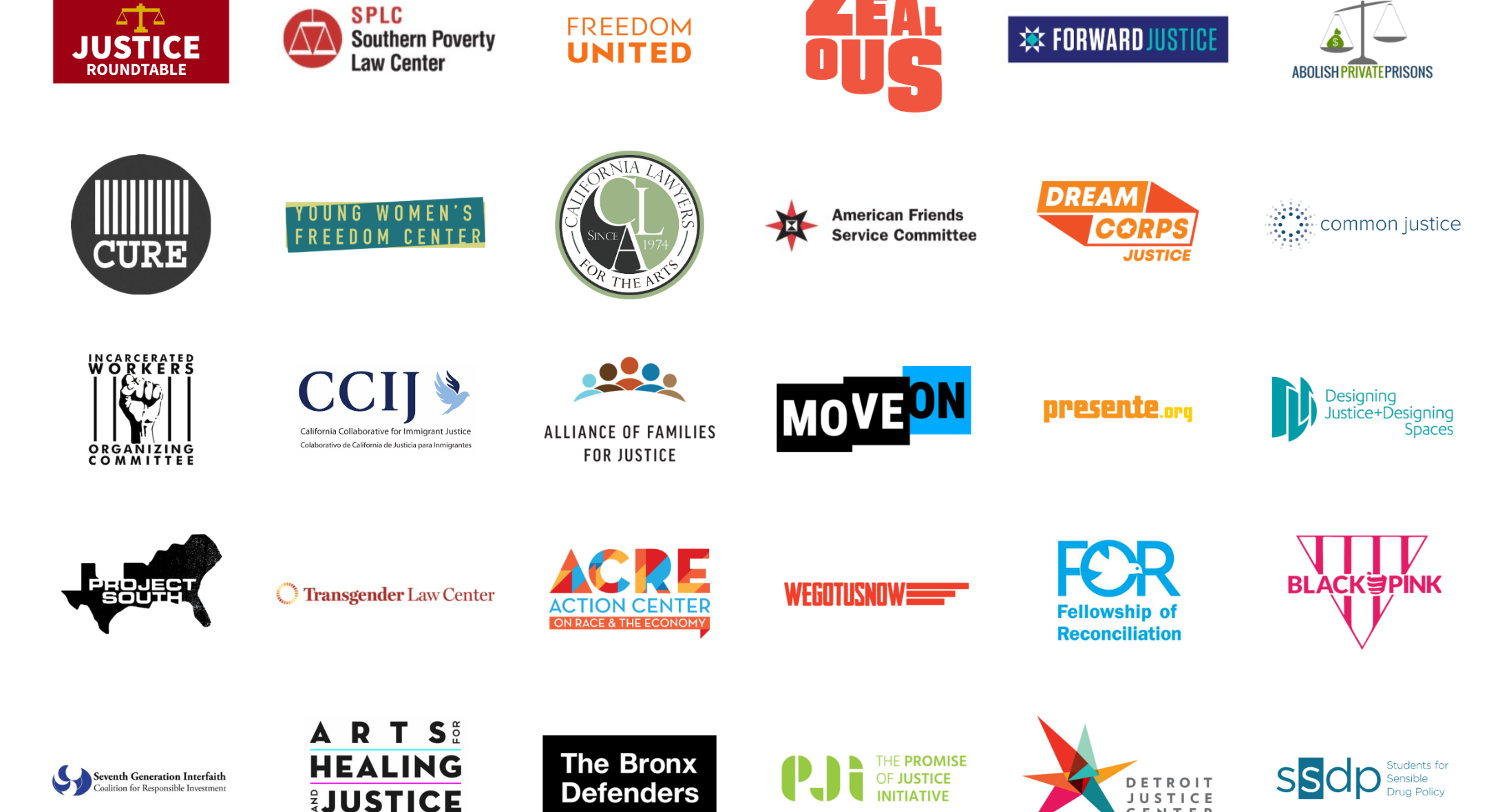
END PLANTATION PRISONS
Slavery never ended in Louisiana.
The U.S. never abolished slavery. Forced labor is everywhere in Louisiana. People in prisons, mostly Black, are invisible to the public and are forced to work under oftentimes dangerous, sometimes humiliating conditions at their own physical peril. Labor is extracted, always at the threat of violence, for pennies an hour or nothing at all.
JUMP TO CONTENT…
“Angola is still a slave plantation.
People should know. Slavery never ended for us.”
— Terrance Winn
IN THE COURTS
Class Action Suit Challenges Unconstitutional Forced Labor at Angola Prison
VOTE, et al. v. LeBlanc, et al., 3:23-cv-1204-BAJ-EWD (M.D. La).
In September 2023, the Promise of Justice Initiative and Rights Behind Bars filed a lawsuit against the Louisiana Department of Corrections and Prison Enterprises challenging the harsh and unconstitutional conditions of forced agricultural labor at the Louisiana State Penitentiary.
The lawsuit has already created tremendous visibility to the issue of forced labor in prison outside of the court. Incredibly, despite significant resistance, Louisiana Department of Corrections has already made informal changes when it has forced people to work in the heat and the conditions under which people work in the fields (however, these changes are insufficient and occur at the whim of the warden). The lawsuit has attracted significant interest in partnerships from like-minded people and organizations around the country.
October 2024 court filings include stories from our clients, men incarcerated at Angola who have worked on the Farm Line. They refer to numerous incidents in which guards in the fields used racist language and degrading treatment, including rampant use of the word “boy” and threats of hanging.
PJI Joins Center for Constitutional Rights in Special Communication to the United Nations
On September 30, 2024, PJI and the Center for Constitutional Rights sent a Special Communication Complaint to the Special Rapporteur on contemporary forms of slavery; the Special Rapporteur on torture and other cruel, inhuman or degrading treatment or punishment; the International Independent Expert Mechanism to Advance Racial Justice and Equality in the Context of Law Enforcement (UN EMLER); and the Office of the United Nations High Commissioner for Human Rights requesting immediate attention and intervention related to the practices of slavery, involuntary servitude, and other forms of forced labor of incarcerated persons in prisons in the United States – namely, in the southern States of Alabama and Louisiana. Read the complaint here.

STORYTELLING
Plantations and Prisons:
A History of Forced Labor in Louisiana
Narrative construction and storytelling are core to how we organize society, embody power, gain legitimacy, and understand who we are individually and as a people. Through dominant narratives, we (including Black people) have been indoctrinated to fear Black people and other people of color. This indoctrination creates public support and even demand for racialized (racist) policing, charging decisions, legal representation, juror, parole, and clemency board decisions, dehumanizing institutional treatment, and limited opportunity in prison and for families of people in prison.
In September 2023, we premiered a new documentary produced by PJI called Plantations and Prisons: A History of Forced Labor in Louisiana. The film premiered at a special event held at Whitney Plantation.
Watch The Film
We confront the myths that prisons create safety and that people with convictions are undeserving of basic rights, and we work to expose the structures of racism and exclusion that sustain these beliefs. Our work is funded by individuals who believe in a world that no longer warehouses human beings.
We continue to host screenings of the documentary all over the world. Sara Gozalo, PJI's Associate Director of Storytelling and director of the film, presented a screening in Geneva, Switzerland, at the 57th session of the UN Human Rights Council. The film continues to strike audiences in powerful ways, raising awareness of the invisible labor and suffering of people forced to work inside of prisons.
VIDEO TESTIMONIES
Forced Labor in the Bayou State
Louisiana's evolution from mass enslavement to mass incarceration is undeniable. Hear the compelling, first-hand accounts of personal experiences of modern forced labor directly from survivors of hard labor sentences.
Photo credit: Jackson Hill
Punitive by Design
EDUCATION
THE FARM LINE AT LOUISIANA STATE PENITENTIARY
PJI published a report on compulsory agriculture labor at the Louisiana State Penitentiary (Angola) titled Punitive by Design. Co-authored with Prof. Andrea Armstrong, this report exposes the harsh conditions of forced labor at Angola and the serious harms caused by this practice. In addition to illuminating the history of forced prison labor in Louisiana, the report also helps preserve and uplift the voices of survivors of hard labor sentences.
Forced Labor In Your Backyard
Incarcerated labor is everywhere in Louisiana.
Often invisible to the public, incarcerated people are forced to clean government buildings and fix public roads. They cultivate plantation crops, manufacture soap, and produce garments. The State even relies on incarcerated people to respond to environmental disasters.
To better understand forced prison labor in Louisiana, we conducted hundreds of hours of historical and contemporary research. We also interviewed more than 100 currently and formerly-incarcerated people who were sentenced to hard labor.
PJI created an interactive map that shows how incarceration touches people in every part of Louisiana, including every one of the 130 facilities that hold people behind bars.
ADVOCACY
Making Prison & Jail Phone Calls Free
As part of the Promise of Justice Initiative’s End Plantation Prisons project, we are a proud coalition partner with organizations and individuals committed to ending the extractive economies from mass incarceration, including expensive prison and jail phone calls.
The coalition is fighting for free phone calls for families in Louisiana who pay very high rates to talk with their incarcerated loved ones in jails and prisons. Money extracted from struggling families or incarcerated people go to private, for-profit, providers to enrich their billionaire owners, private equity firms, and shareholders. Corporations should not exploit vulnerable people who only want to maintain basic familial bonds.
Keeping families connected through the trauma of incarceration:
reduces recidivism,
benefits the mental well-being of incarcerated people,
and increases the educational outcomes of children with incarcerated parents.
Our free phone calls campaign builds on the incredible win by our coalition partners, who successfully pushed the Federal Communications Commission (FCC) to release new regulations on telecommunications for jails and prisons in the United States.
The coalition’s first goal is to work with Sheriff Susan Hutson and the New Orleans City Council to pass a resolution that will make Orleans Parish Jail’s phone calls completely FREE.
SIGN UP NOW
Real change starts at home. Together, we can keep Louisiana families connected with their incarcerated loved ones.
PJI ON CAPITOL HILL
In May 2024, PJI attended a United States Senate hearing and submitted testimony in support of bills introduced by Senator Cory Booker geared towards ending unfair and abusive labor practices in correctional facilities in the United States.
Our friends and partners Mr. Terrance Winn, a formerly-incarcerated prison reform advocate from Shreveport, and Professor Andrea Armstrong of Loyola New Orleans College of Law (and PJI Board Member Emerita) testified before the Subcommittee for Criminal Justice and Counterterrorism in an impactful hearing (pictured above).
Read the Associated Press article on the hearing.
PARTNERSHIPS
Captive State: Louisiana and the Making of Mass Incarceration
As part of our End Plantation Prisons campaign, we have built a strong partnership with the Historic New Orleans Collection, a museum and research center based in the French Quarter in New Orleans. We collaborated with historians and other staff for more than two years on a major exhibition on the history of incarceration in Louisiana called Captive State: Louisiana and the Making of Mass Incarceration. The opening date was in the Summer of 2024. The exhibit will expose thousands of people to the terrible history of the carceral state and forced labor in Louisiana
Photo credit: Jackson Hill
PJI has partnered with Southern Poverty Law Center (SPLC) on a number of cases and initiatives in recent years. In Fall 2023, we collaborated to support the visit of the UN Special Rapporteur (Ashwini K.P.) to Louisiana. The subsequent report issued by the UN Human Rights Council notes the troubling practices of forced prison labor at Louisiana State Penitentiary.

NATIONAL COALITION
END THE EXCEPTION
Passed in 1865, the Thirteenth Amendment to the U.S. Constitution is celebrated for abolishing slavery and involuntary servitude. However, to the surprise of many, the Thirteenth Amendment includes an exception that allows slavery and involuntary servitude to be used as punishment for crime. During Reconstruction, this exception allowed states to pass Black Codes that allowed for the criminalization, incarceration, and re-enslavement Black people. Still today, more than 150 years later, people who are incarcerated and labor under this exception across our country are still disproportionately Black and brown.
Slavery is wrong, and our Constitution should reflect our values.
Along with our many partners, PJI supports a bipartisan joint resolution (S.J.R. 21 and H.J.R 53) to amend the U.S. Constitution to prohibit the use of slavery and involuntary servitude as a punishment for crime.
PJI is proud to be part of a national coalition working to #EndTheException.
LATEST NEWS
TAKE ACTION
Join the fight to make prison and jail phone calls free!
Help End Plantation Prisons with a tax-deductible gift.









